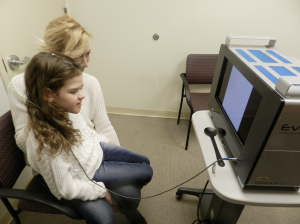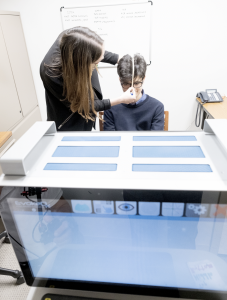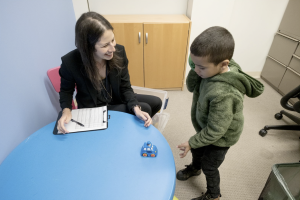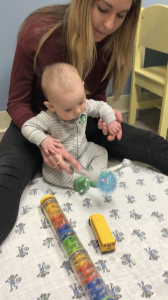Our Research
The Siper Lab focuses on comprehensive characterization of children, adolescents and adults with neurodevelopmental disorders with a focus on sensory processing and biomarker discovery. Our long-term goal is to develop objective and reliable biomarkers and clinical outcome assessments that will answer critical questions about underlying mechanisms, biological and phenotypic subtyping, brain-behavior relations, and, ultimately, the appropriateness of using such markers to predict and measure treatment response. Our work includes individuals with both idiopathic and single-gene causes of autism spectrum disorder (ASD), intellectual disability (ID), and related neurodevelopmental disorders (NDDs). We are dedicated to the inclusion of individuals of all levels of functioning in our research studies.
The Siper Lab is part of the Seaver Autism Center for Research and Treatment at the Icahn School of Medicine at Mount Sinai. The Seaver Autism Center is a fully integrated, translational research center that leads progressive studies and provides personalized care to individuals with autism and related rare disorders. As a team, we are dedicated to discovering the biological causes of autism and developing breakthrough treatments.
Learn more about the Seaver Autism Center’s translational research approach here.

Contact Us
Paige Siper, PhD
Chief Psychologist,
Seaver Autism Center
Assistant Professor, Department of Psychiatry
Paige.siper@mssm.edu
Funding & Awards
Seaver Foundation (PI: Buxbaum) Role: Co-I 06/01/98 – 05/31/20
Beatrice and Samuel A. Seaver Foundation
Seaver Autism Center for Research and Treatment
The mission of the Seaver Autism Center is to enhance the diagnosis of autism and related disorders, discover the biological causes of those disorders, and develop and disseminate breakthrough treatments.
U01HL098123 (PI: Gelb) Role: Co-I 08/01/15 – 07/31/20
NIH/NHLBI
Genetics of conotruncal defects and associated neurodevelopmental outcomes
This study aims to identify the underlying genetic and epigenetic abnormalities of conotruncal congenital heart disease and the role of these abnormalities in determining neurodevelopmental outcomes.
Autism Science Foundation (PI: Siper) Role: PI 06/01/16 – 05/31/20
Autism Sisters Project
This initiative involves the development and validation of a web based battery of assessments that can be distributed remotely and used reliably in siblings and parents of children with ASD.
AMO Pharma (PI: Kolevzon) Role: Co-I 12/22/17 – 12/21/19
An open-label study to investigate the safety, tolerability and efficacy of a single 6-hour intravenous infusion of AMO-01 to treat adolescents and adults with Phelan-McDermid Syndrome (PMS) and co-morbid epilepsy
The goal of this study is to evaluate the safety and tolerability of a single 6-hour intravenous infusion of AMO-01, from Baseline through Week 4.
R01NS105845 (PI: Kolevzon) Role: Co-I 05/15/18 – 04/30/23
NIH/NINDS
Electrophysiological markers for interventions in Phelan-McDermid syndrome and idiopathic autism
Our short-term goal is to show that select electrophysiological markers in PMS are relevant to iASD and predictive of treatment response. Our long-term goal is to optimize treatment selection in iASD by establishing biological signature(s) derived from PMS that are: a) useful for predicting treatment responders, and b) responsive to intervention.
No ID (PI: Buxbaum) Role: Co-I 04/01/18 – 03/31/20
Seaver Els Institute
The Seaver Els Institute: an affiliation between the Seaver Autism Center at Mount Sinai and the Els for Autism Foundation
The purpose of this research is to collect genetic information from individuals with neurodevelopmental disorders and their family members, to evaluate the effectiveness of interventions being implemented at the Els Center of Excellence, and to develop biological markers of neurodevelopmental disorders based on objective behavioral and brain-based measures. The goal of this research is to help provide a better understanding of the nature, symptoms, and treatment of neurodevelopmental disorders.
U54NS092090 Renewal (PI: Sahin) Role: Co-I 09/20/19 – 07/31/24
NIH – Boston Children’s Hospital
Developmental synaptopathies associated with TSC, PTEN and SHANK3 mutations
The major goals of this project are to: 1) comprehensively characterize PMS and track the natural history of the syndrome; 2) validate neurophysiological biomarkers of PMS; 3) develop a comprehensive, multi-level, longitudinal model of PMS to inform future clinical trials and the development of consensus care guidelines
R01MH119172 (PI: Foss-Feig) Role: Co-I 08/06/19 – 05/31/24
NIH/NIMH
PROMIS-guided development and validation of a dimensional observer-report measure of positive and negative features of ASD
This project proposes to develop and validate an innovative new observer report measure for ASD that attempts to capture heterogeneity in core symptoms along positive and negative dimensions, akin to those that have been successful in quantifying heterogeneity and facilitating key biological and therapeutic discoveries in schizophrenia.
U54NS092090 (PI: Sahin) Role: Co-I 09/30/14 – 07/31/19
NIH – Boston Children’s Hospital
Developmental Synaptopathies Associated with TSC, PTEN and SHANK3 Mutations
The major goals of this project are to: 1) comprehensively characterize the phenotype and natural history of PMS using a broad medical, cognitive, and behavioral assessment battery; 2) identify biomarkers using neuroimaging to provide a critical link between brain imaging abnormalities and the neurobehavioral phenotype; 3) identify genetic factors which contribute to diverse phenotypes in patients with PMS.
Phelan-McDermid Syndrome Foundation Role: mPI: Siper, Mosconi) 02/01/16 – 02/28/18
Electrophysiological Biomarkers of Phelan-McDermid syndrome
The aims of this study are to (1) measure resting state EEG in children with PMS, (2) develop rapid and reliable electrophysiological biomarkers of PMS within early visual pathways, and (2) examine the neurophysiology of auditory processing in PMS.
R21 (PI: Buxbaum) Role: Co-I 04/19/16-03/31/18
NIH/NIMH
Development of behavioral and neural biomarkers for autism spectrum disorder using a genetically defined subtype
The aims of this study are (1) to quantify visual hyporeactivity, hypperreactivity, and sensation seeking behaviors in children with Phelan-McDermid syndrome and idiopathic forms of ASD, and (2) to develop rapid and reliable electrophysiological biomarkers of Phelan-McDermid syndrome and idiopathic ASD within early visual pathways
Goldstein Charitable Trust Role: mPI: Gorenstein; Siper 11/01/17 – 10/31/18
Lincoln Center Education – Big Umbrella Festival
The Seaver Autism Center for Research and Treatment at Mount Sinai has partnered with Lincoln Center Education and Trusty Sidekick to better understand how the ASD population experiences immersive theatre.
Autism Speaks, Meixner Translational Research Postdoctoral Fellowship PI: Siper, Mentor: Kolevzon 09/01/2013 – 08/31/2015
Early-Stage Visual Processing in ASD: Neurophysiological Biomarkers Using Visual Evoked Potentials
The aims of this study were (1) to assess the integrity of visual pathways in severely affected children with idiopathic ASD and unaffected siblings, and (2) to investigate whether short-duration VEPs could provide a neurophysiological biomarker in subgroups of children with ASD.
Postdoctoral Recognition Award, Icahn School of Medicine at Mount Sinai 12/5/2013
Current Projects
1. Electrophysiological assessment of sensory processing underlying ASD and ID.
The Siper Lab applies an electrophysiological technique known as a visual evoked potential (VEP) to study early-stage visual processing in children with idiopathic and single-gene forms of ASD and ID. We are particularly interested in developing methods that are feasible for severely affected populations. To date, our lab has collected VEPs from over 300 participants. VEPs offer a noninvasive measure of excitatory and inhibitory neurotransmission, and our preliminary data suggests that VEPs may reflect an objective marker of behavioral sensory reactivity. Our long-term goal is to establish VEPs as a biologically-relevant and clinically-meaningful tool for use as a stratification marker or surrogate endpoint in clinical trials. Our work to date has identified significant differences in both transient and steady-state VEPs, as well as increased neural noise in children with ASD. We also use single-channel VEP recordings to examine markers of excitatory/inhibitory balance in single-gene causes of ASD including Phelan-McDermid syndrome, ADNP syndrome, FOXP1 syndrome DDX3X syndrome, and Fragile X syndrome. Our battery of short-duration stimulus conditions is currently being used in the context of ongoing clinical trials at the Seaver Autism Center and across multiple sites within our Rare Diseases Clinical Research Network (RDCRN).


2. Development of the Sensory Assessment for Neurodevelopmental Disorders.
Dr. Siper is the co-developer of the Sensory Assessment for Neurodevelopmental Disorders (SAND), a sensory observation and corresponding caregiver interview measuring sensory symptoms commonly observed in individuals with NDDs. The SAND quantifies sensory reactivity as described by the Diagnostic and Statistical Manual of Mental Disorders, 5th Edition (DSM-5). The SAND is appropriate for use in individuals of all levels of functioning. A scoring algorithm captures sensory hyperreactivity, hyporeactivity, and seeking behavior across visual, auditory and tactile domains. The SAND was recently licensed to Stoelting, Co. and is expected to become available in early 2021.
Our lab also has an active collaboration with Mount Sinai’s Neonatal Intensive Care Unit (NICU) Follow-up Program to develop and validate an infant/toddler version of the SAND. The follow-up program follows all NICU graduates from birth to 24 months. Sensory processing difficulties represent one of the earliest clinically observable predictors of a neurodevelopmental disorder (NDD). Our long-term goal is to establish methods for early detection of potentially modifiable sensory processing differences that may be future predictors of an NDD. To date we have established the feasibility of SAND administration on a cohort of infants presenting to the NICU follow-up clinic as young as 6 months of age.

3. Comprehensive clinical characterization of individuals with idiopathic and single-gene neurodevelopmental disorders.
 Our lab focuses on the development and implementation of in-depth phenotyping protocols using standardized measures of cognition, ASD symptoms, sensory reactivity, expressive and receptive language, fine and gross motor skills, visual-motor integration, and associated psychiatric symptoms. We develop neuropsychological testing batteries for a variety of research protocols for individuals presenting to the Center’s Rare Disease Program.
Our lab focuses on the development and implementation of in-depth phenotyping protocols using standardized measures of cognition, ASD symptoms, sensory reactivity, expressive and receptive language, fine and gross motor skills, visual-motor integration, and associated psychiatric symptoms. We develop neuropsychological testing batteries for a variety of research protocols for individuals presenting to the Center’s Rare Disease Program.
Recent Publications
Team

Paige Siper, PhD
Chief Psychologist

Jessica Zweifach, PhD
Clinical Psychologist

Christina Layton
Clinical Research Coordinator

Nurit Benrey-Griberg
Graduate Student

Audrey Rouhandeh
Graduate Student
Past members:
Stacey Lurie, PhD, Clinical Research Coordinator & Graduate Student
Mikaela Rowe, Clinical Research Coordinator
Julia George-Jones, Clinical Research Coordinator
Contact Us
Paige Siper, PhD
Chief Psychologist, Seaver Autism Center
Assistant Professor, Department of Psychiatry
Paige.siper@mssm.edu
